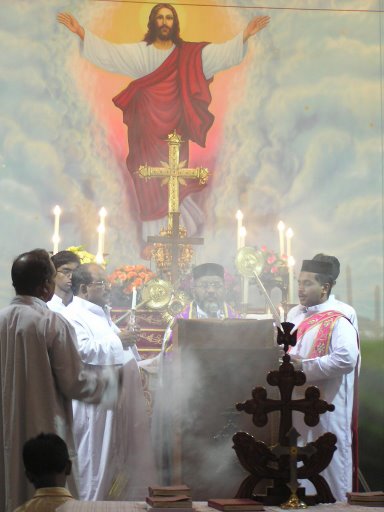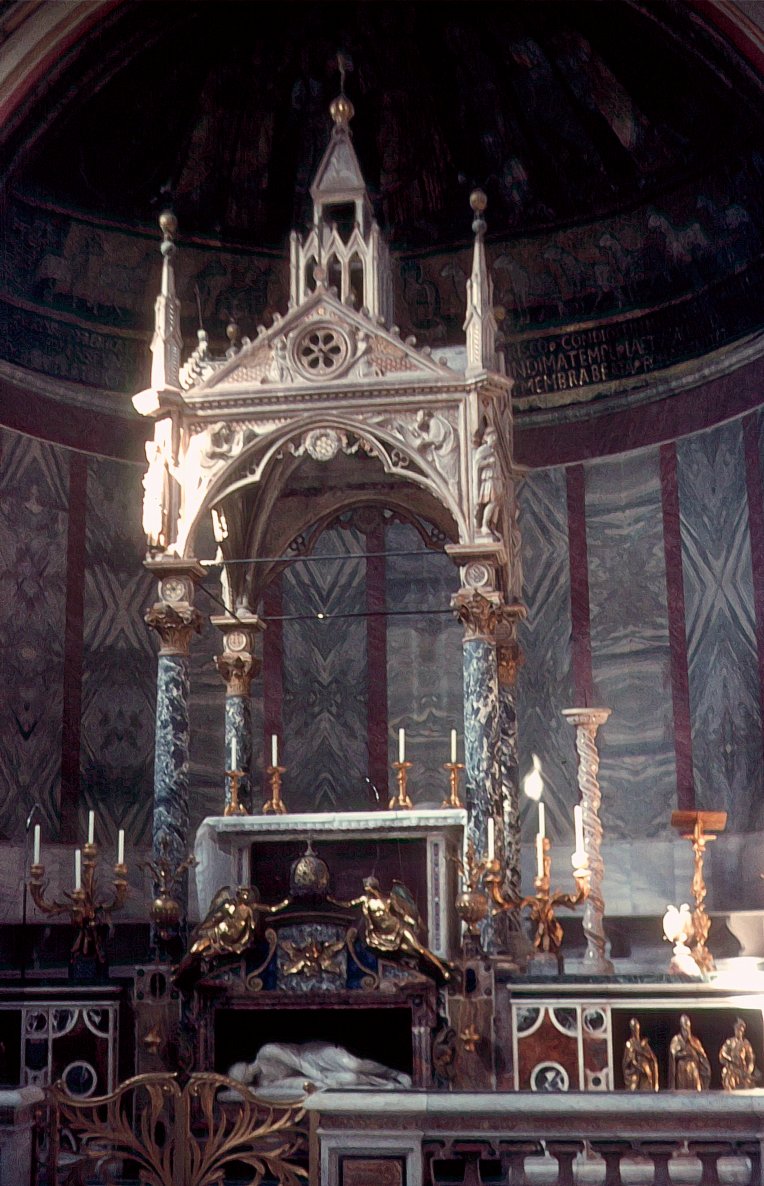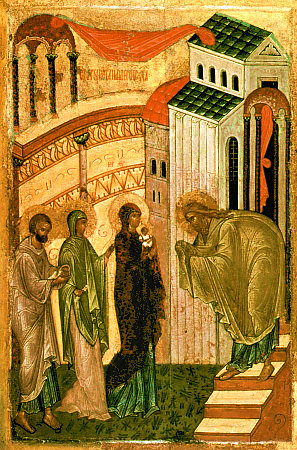|
Vigils
In Christian liturgy, a vigil is, in origin, a religious service held during the night leading to a Sunday or other feastday. The Latin term ''vigilia'', from which the word is derived meant a watch night, not necessarily in a military context, and generally reckoned as a fourth part of the night from sunset to sunrise. The four watches or vigils were of varying length in line with the seasonal variation of the length of the night. Etymology The English term " wake", which later became linked to a gathering before a funeral, also denoted originally such a prayer service, and the term "vigil" is even now also used for a funeral service of that kind. History Early Christianity The practice of rising for prayer in the middle of the night is "as old as the church herself". It may be inspired by Jesus Christ's example of praying all night. There is evidence of the practice from the first years of the second century. Pliny the Younger reported in about 112 that Christians gath ... [...More Info...] [...Related Items...] OR: [Wikipedia] [Google] [Baidu] |
Canonical Hour
In the practice of Christianity, canonical hours mark the divisions of the day in terms of fixed times of prayer at regular intervals. A book of hours, chiefly a breviary, normally contains a version of, or selection from, such prayers. In the Roman Rite of the Catholic Church, canonical hours are also called ''offices'', since they refer to the official set of prayers of the Church, which is known variously as the ("divine service" or "divine duty"), and the ("work of God"). The current official version of the hours in the Roman Rite is called the Liturgy of the Hours ( la, liturgia horarum) in North America or divine office in Ireland and Britain. In Lutheranism and Anglicanism, they are often known as the daily office or divine office, to distinguish them from the other "offices" of the Church (e.g. the administration of the sacraments). In the Eastern Orthodox and Byzantine Catholic Churches, the canonical hours may be referred to as the divine services, and the '' ... [...More Info...] [...Related Items...] OR: [Wikipedia] [Google] [Baidu] |
Feast Of The Ascension
The Solemnity of the Ascension of Jesus Christ, also called Ascension Day, Ascension Thursday, or sometimes Holy Thursday, commemorates the Christian belief of the bodily Ascension of Jesus into heaven. It is one of the ecumenical (i.e., shared by multiple denominations) feasts of Christian churches, ranking with the feasts of the Passion and Pentecost. Following the account of that the risen Jesus appeared for 40 days prior to his Ascension, Ascension Day is traditionally celebrated on a Thursday, the fortieth day of Easter; although some Christian denominations have moved the observance to the following Sunday. The day of observance varies by ecclesiastical province in many Christian denominations, as with Methodists and Catholics, for example. History The observance of this feast is of great antiquity. Eusebius seems to hint at the celebration of it in the 4th century. At the beginning of the 5th century, Augustine of Hippo says that it is of Apostolic origin, and he speaks o ... [...More Info...] [...Related Items...] OR: [Wikipedia] [Google] [Baidu] |
Middle Ages
In the history of Europe, the Middle Ages or medieval period lasted approximately from the late 5th to the late 15th centuries, similar to the post-classical period of global history. It began with the fall of the Western Roman Empire and transitioned into the Renaissance and the Age of Discovery. The Middle Ages is the middle period of the three traditional divisions of Western history: classical antiquity, the medieval period, and the modern period. The medieval period is itself subdivided into the Early, High, and Late Middle Ages. Population decline, counterurbanisation, the collapse of centralized authority, invasions, and mass migrations of tribes, which had begun in late antiquity, continued into the Early Middle Ages. The large-scale movements of the Migration Period, including various Germanic peoples, formed new kingdoms in what remained of the Western Roman Empire. In the 7th century, North Africa and the Middle East—most recently part of the Ea ... [...More Info...] [...Related Items...] OR: [Wikipedia] [Google] [Baidu] |
Roman Rite
The Roman Rite ( la, Ritus Romanus) is the primary liturgical rite of the Latin Church, the largest of the ''sui iuris'' particular churches that comprise the Catholic Church. It developed in the Latin language in the city of Rome and, while distinct Latin liturgical rites such as the Ambrosian Rite remain, the Roman Rite has gradually been adopted almost everywhere in the Latin Church. In medieval times there were numerous local variants, even if all of them did not amount to distinct rites, yet uniformity increased as a result of the invention of printing and in obedience to the decrees of the Council of Trent of 1545–63 (see ''Quo primum''). Several Latin liturgical rites that survived into the 20th century were abandoned voluntarily after the Second Vatican Council. The Roman Rite is now the most widespread liturgical rite not only in the Catholic Church but in Christianity as a whole. The Roman Rite has been adapted through the centuries and the history of its Eucharistic ... [...More Info...] [...Related Items...] OR: [Wikipedia] [Google] [Baidu] |
Pope Leo XIII
Pope Leo XIII ( it, Leone XIII; born Vincenzo Gioacchino Raffaele Luigi Pecci; 2 March 1810 – 20 July 1903) was the head of the Catholic Church from 20 February 1878 to his death in July 1903. Living until the age of 93, he was the second-oldest-serving pope, and the third-longest-lived pope in history, before Pope Benedict XVI as Pope emeritus, and had the fourth-longest reign of any, behind those of St. Peter, Pius IX (his immediate predecessor) and John Paul II. He is well known for his intellectualism and his attempts to define the position of the Catholic Church with regard to modern thinking. In his famous 1891 encyclical ''Rerum novarum'', Pope Leo outlined the rights of workers to a fair wage, safe working conditions, and the formation of trade unions, while affirming the rights of property and free enterprise, opposing both socialism and laissez-faire capitalism. With that encyclical, he became popularly titled as the "Social Pope" and the "Pope of the Workers", als ... [...More Info...] [...Related Items...] OR: [Wikipedia] [Google] [Baidu] |
All Saints' Day
All Saints' Day, also known as All Hallows' Day, the Feast of All Saints, the Feast of All Hallows, the Solemnity of All Saints, and Hallowmas, is a Christian solemnity celebrated in honour of all the saints of the church, whether they are known or unknown. From the 4th century, feasts commemorating all Christian martyrs were held in various places, on various dates near Easter and Pentecost. In the 9th century, some churches in the British Isles began holding the commemoration of all saints on 1 November, and in the 9th century this was extended to the whole Catholic church by Pope Gregory IV. In Western Christianity, it is still celebrated on 1 November by the Roman Catholic Church as well as many Protestant churches, as the Lutheran, Anglican, and Methodist traditions. The Eastern Orthodox Church and associated Eastern Catholic and Eastern Lutheran churches celebrate it on the first Sunday after Pentecost. The Syro-Malabar Church and the Chaldean Catholic Church, bot ... [...More Info...] [...Related Items...] OR: [Wikipedia] [Google] [Baidu] |
Nativity Of Saint John The Baptist
The Nativity of John the Baptist (or Birth of John the Baptist, or Nativity of the Forerunner, or colloquially Johnmas or St. John's Day (in German) Johannistag) is a Christian feast day celebrating the birth of John the Baptist. It is observed annually on 24 June. The Nativity of John the Baptist is a high-ranking liturgical feast, kept in the Roman Catholic, Anglican, Eastern Orthodox and Lutheran churches. The sole biblical account of the birth of John the Baptist comes from the Gospel of Luke. Significance Christians have long interpreted the life of John the Baptist as a preparation for the coming of Jesus Christ, and the circumstances of his birth, as recorded in the New Testament, are miraculous. John's pivotal place in the gospel is seen in the emphasis Luke gives to the announcement of his birth and the event itself, both set in prominent parallel to the same occurrences in the life of Jesus. The sole biblical account of the birth of John the Baptist comes from the G ... [...More Info...] [...Related Items...] OR: [Wikipedia] [Google] [Baidu] |
Pentecost
Pentecost (also called Whit Sunday, Whitsunday or Whitsun) is a Christian holiday which takes place on the 50th day (the seventh Sunday) after Easter Sunday. It commemorates the descent of the Holy Spirit upon the Apostles and other followers of Jesus Christ while they were in Jerusalem celebrating the Feast of Weeks, as described in the Acts of the Apostles (Acts 2:1–31). In Western Christianity, Pentecost is celebrated on the 50th day (the seventh Sunday) after Easter Sunday. In the United Kingdom, traditionally the next day, Whit Monday, was (until 1970) also a public holiday. (Since 1971, by statute, the last Monday in May has been a Bank Holiday). The Monday after Pentecost is a legal holiday in many European countries. In Eastern Christianity, Pentecost can also refer to the entire fifty days of Easter through Pentecost inclusive; hence the book containing the liturgical texts is called the "'' Pentecostarion''". Since its date depends on the date of Easter, Pen ... [...More Info...] [...Related Items...] OR: [Wikipedia] [Google] [Baidu] |
Easter Day
Easter,Traditional names for the feast in English are "Easter Day", as in the ''Book of Common Prayer''; "Easter Sunday", used by James Ussher''The Whole Works of the Most Rev. James Ussher, Volume 4'') and Samuel Pepys''The Diary of Samuel Pepys, Volume 2'') as well as the single word "Easter" in books printed i157515841586 also called Pascha (Aramaic, Greek, Latin) or Resurrection Sunday, is a Christian festival and cultural holiday commemorating the resurrection of Jesus from the dead, described in the New Testament as having occurred on the third day of his burial following his crucifixion by the Romans at Calvary . It is the culmination of the Passion of Jesus Christ, preceded by Lent (or Great Lent), a 40-day period of fasting, prayer, and penance. Easter-observing Christians commonly refer to the week before Easter as Holy Week, which in Western Christianity begins on Palm Sunday (marking the entrance of Jesus in Jerusalem), includes Spy Wednesday (on which the betra ... [...More Info...] [...Related Items...] OR: [Wikipedia] [Google] [Baidu] |
Presentation Of Jesus At The Temple
The Presentation of Jesus at the Temple (or ''in the temple'') is an early episode in the life of Jesus Christ, describing his presentation at the Temple in Jerusalem, that is celebrated by many churches 40 days after Christmas on Candlemas, or the "Feast of the Presentation of Jesus". The episode is described in chapter 2 of the Gospel of Luke in the New Testament. Within the account, "Luke's narration of the Presentation in the Temple combines the purification rite with the Jewish ceremony of the redemption of the firstborn ()." In the Eastern Orthodox Church, the Presentation of Jesus at the temple is celebrated as one of the twelve Great Feasts, and is sometimes called ''Hypapante'' (, "meeting" in Greek). The Orthodox Churches which use the Julian Calendar celebrate it on 15 February, and the Armenian Church on 14 February. In Western Christianity, the ''Feast of the Presentation of the Lord'' is also known by its earlier name as the ''Feast of the Purification of the ... [...More Info...] [...Related Items...] OR: [Wikipedia] [Google] [Baidu] |






.jpg)



